

Haji Hasan Zare’kar
Biography of Haji Hasan Zare’kar Haji Sen is the local name of Mr. Haj Hassan Zarekar. Haji Hasan Zare’kar is the third child of a family...
Haji Hasan Zare’kar Biography
Biography of Haji Hasan Zare’kar
Haji Sen is the local name of Mr. Haj Hassan Zarekar. Haji Hasan Zare’kar is the third child of a family six. He comes from a family that has farmed for generations, which is why his family name is Zare’kar meaning farmer in Farsi. Haji Hasan Zare’kar carries out his farm work with his own two hands and invests his entire heart in his work. He firmly believes in traditional farming techniques and insists on avoiding chemical spray and fertilizers in his farming.
A day with Haji Hasan Zare’kar
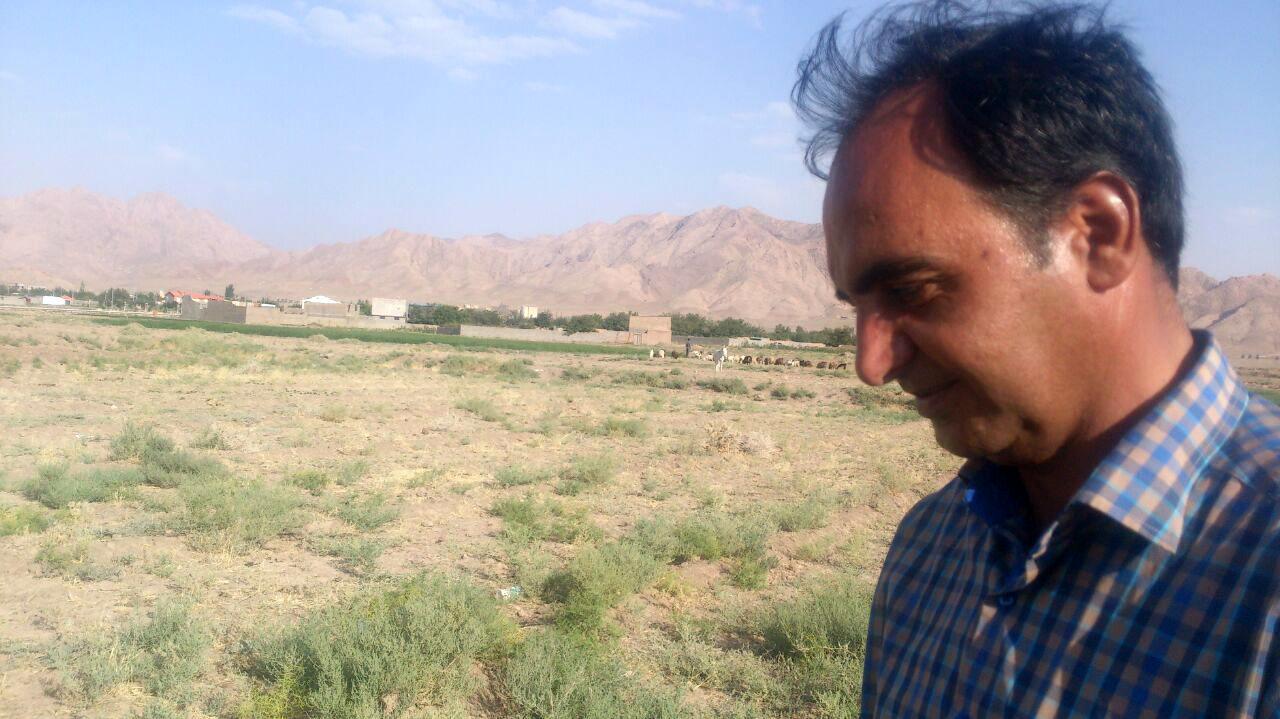
Haj Hassan’s father Haj Ali has passed away, but is remembered as being an incredibly skilled and respected man who had worked for many. Haj Ali was an instrumental character in establishing the first bus route from Qaen to Mashad when the first interurban buses arrived in Iran. During the winter months, most farmers would take it easier because it was the season to make the Shiite pilgrimage hourney to the Shrine of Imam Reza in Mashad. But Haj Ali remained committed to both his farming vocation and bus vocation until the end of his life. His son, Haj Hassan, after graduating from high school and completing his military service, worked as a bus driver in his father’s company. However, because of living close to his father and uncles who were all farmers, Haji Hasan Zare’lar became increasingly interested in farming. Just a few years ago, he decided to leave his bus job and become a full-time saffron famer. In this photo, Haj Hassan stands in the middle of his saffron fields. The farm might look like a piece of uncultivated land, but this is because the photo was taken in the middle of summer when the saffron is dormant. Saffron grows in the winter and goes into hibernation late Spring.
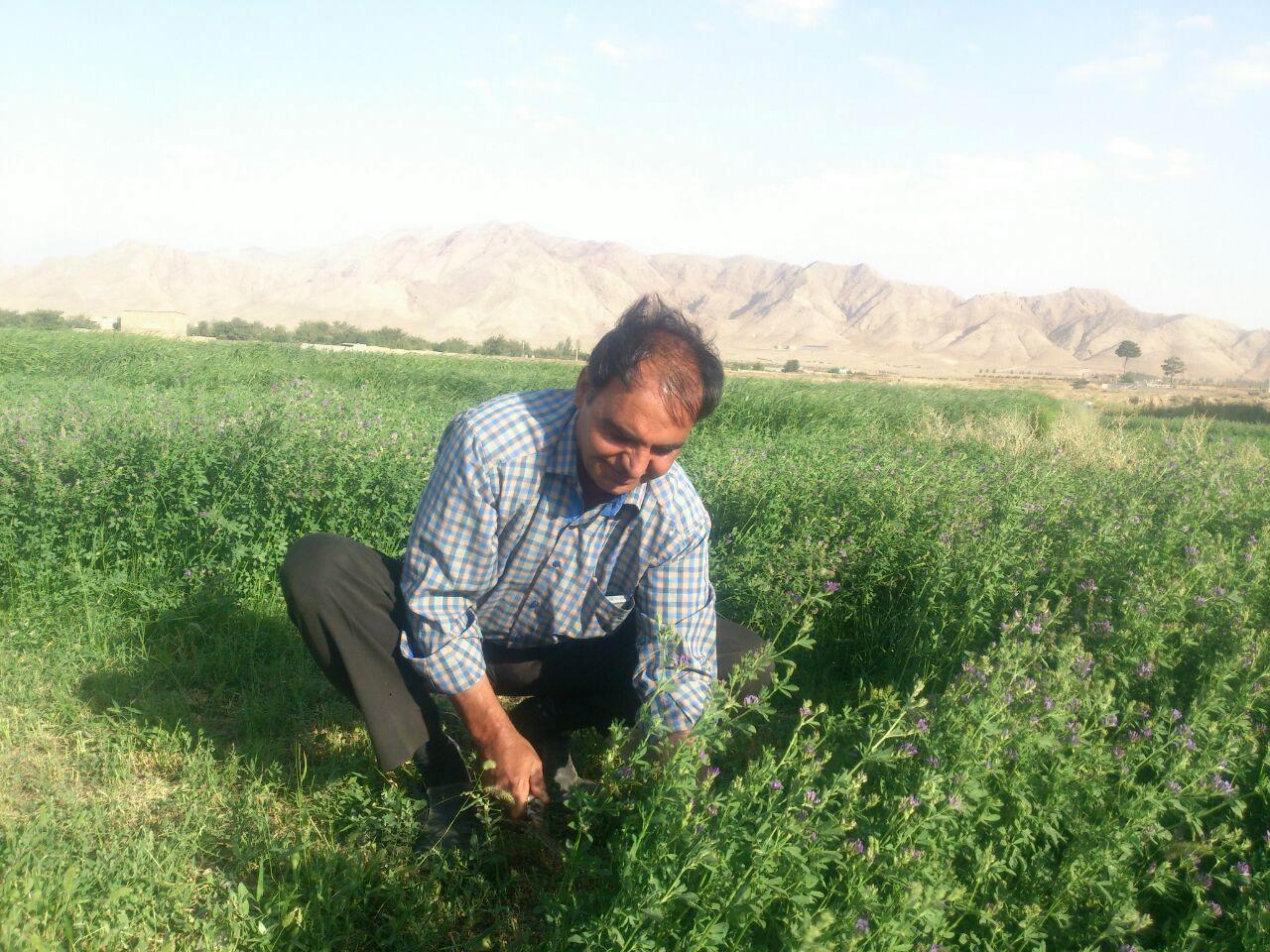 In addition to his main work as a saffron farmer, Haji Hasan Zare’kar grows other crops in the summer months when saffron harvesting comes to a hiatus. Alfalfa is grown as a stock feed by all the farmers here. During the summer months, once a week the Alfalfa plants need watering, which makes it a relatively water-intensive crop.
In addition to his main work as a saffron farmer, Haji Hasan Zare’kar grows other crops in the summer months when saffron harvesting comes to a hiatus. Alfalfa is grown as a stock feed by all the farmers here. During the summer months, once a week the Alfalfa plants need watering, which makes it a relatively water-intensive crop.
The bulk of Haji Hasan Zare’kar’s farm is located in an area where the water supply relies on water from Shahik Qanat. However, Shahik Qanat dried out a few years ago. Now next to the Qanat, farmers have dug a deep well to reach for water. Presently, the water level in the well is significantly low and is not enough to supply all the farms with sufficient water. Because of this, the farmers have tried to dig for water in different places, but the water supply remains low.
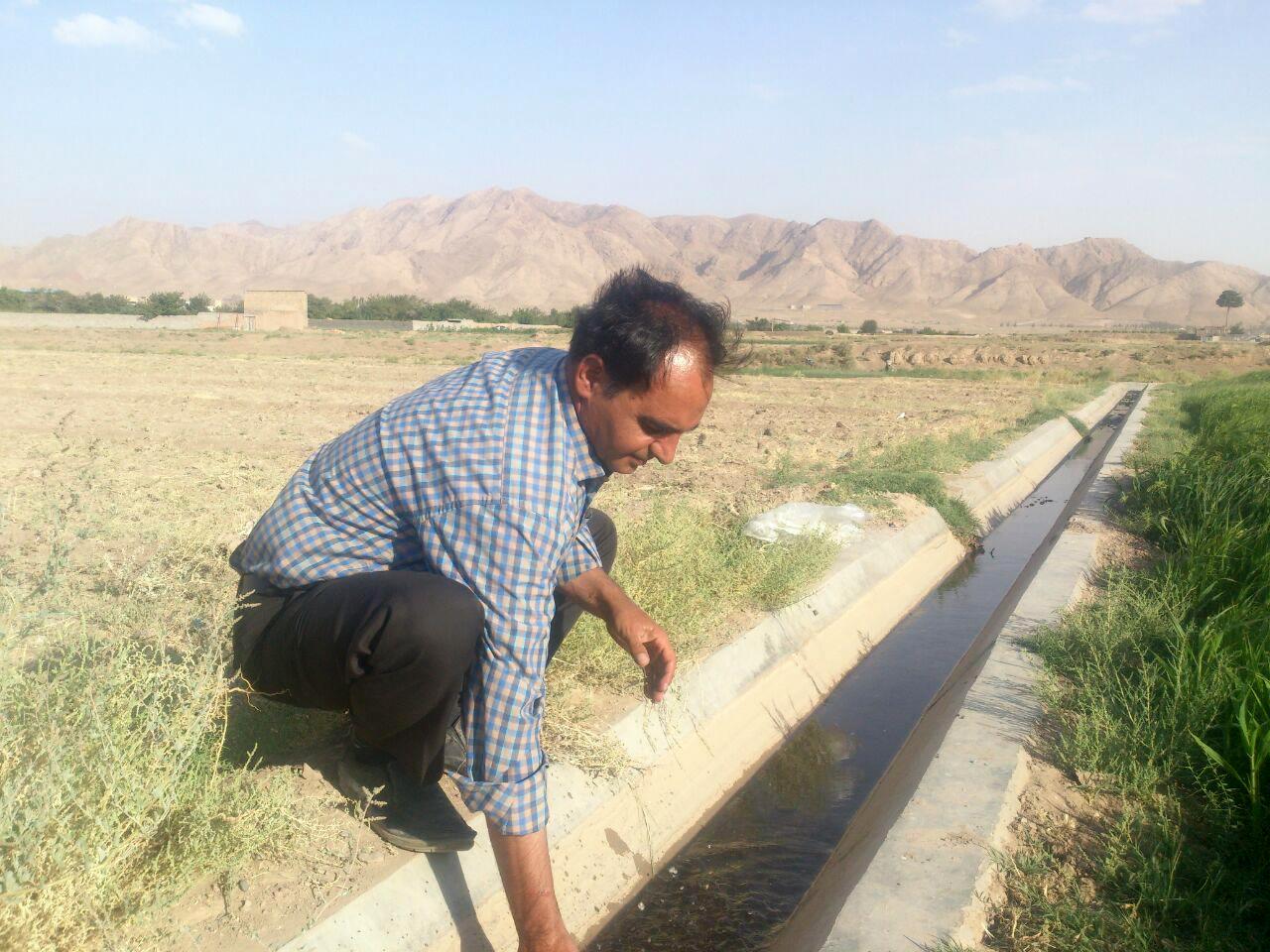
This is a photo of the Shakik aqueduct, which has been blocked in front it they have placed a well-drilled water facility.
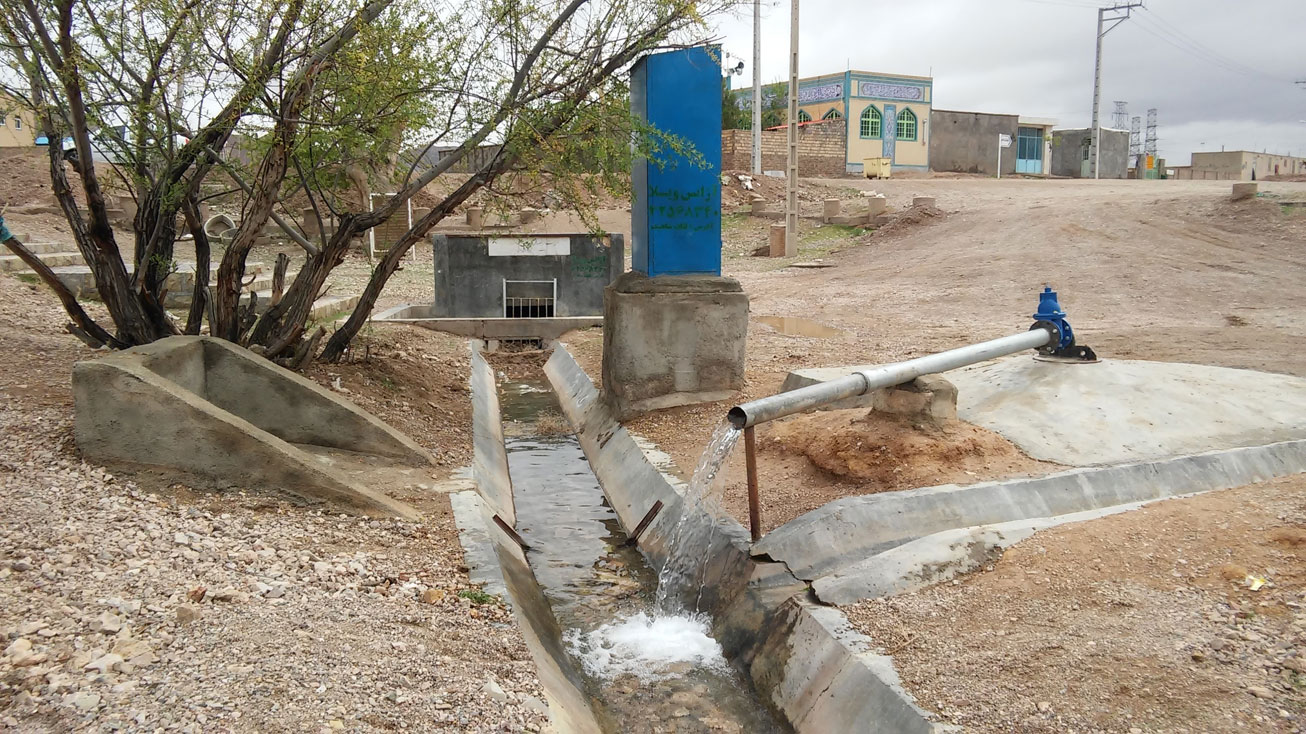
Haji Hasan Zare’kar has planted tomatoes. The local Ghean tomato is juicier, therefore it is perfect for making Shiraz Salad (traditional persian salad). Along with the locally grown onion (another important ingredient in Shiraz salad), it makes a very unique and delicious meal. Tomatoes from his farm can be combined with local Mashadi tomatos from the bazaar to make a colorful and flavorful tomato paste that is unbeatable.
Haji Ali, the father of Haj Hassan, also grew tomatoes. Summer crops of this kind have been planted for generations. Summer to these farmers does not only mean warm days, it also means hard work. This was a lesson that Haji Hasan Zare’kar learnt from his father, to continue the same work ethic throughout the year. Unfortunately, in the last 15 years, the area Haji Zare’kar’s farm is located in has seen a number of severe changes. The mountains and farms remained where they have always been, but the water that used to run through this area is now nowhere to be seen. Shahik Qanat that been supplied water for the last 700 years dried out in the last 45 years.
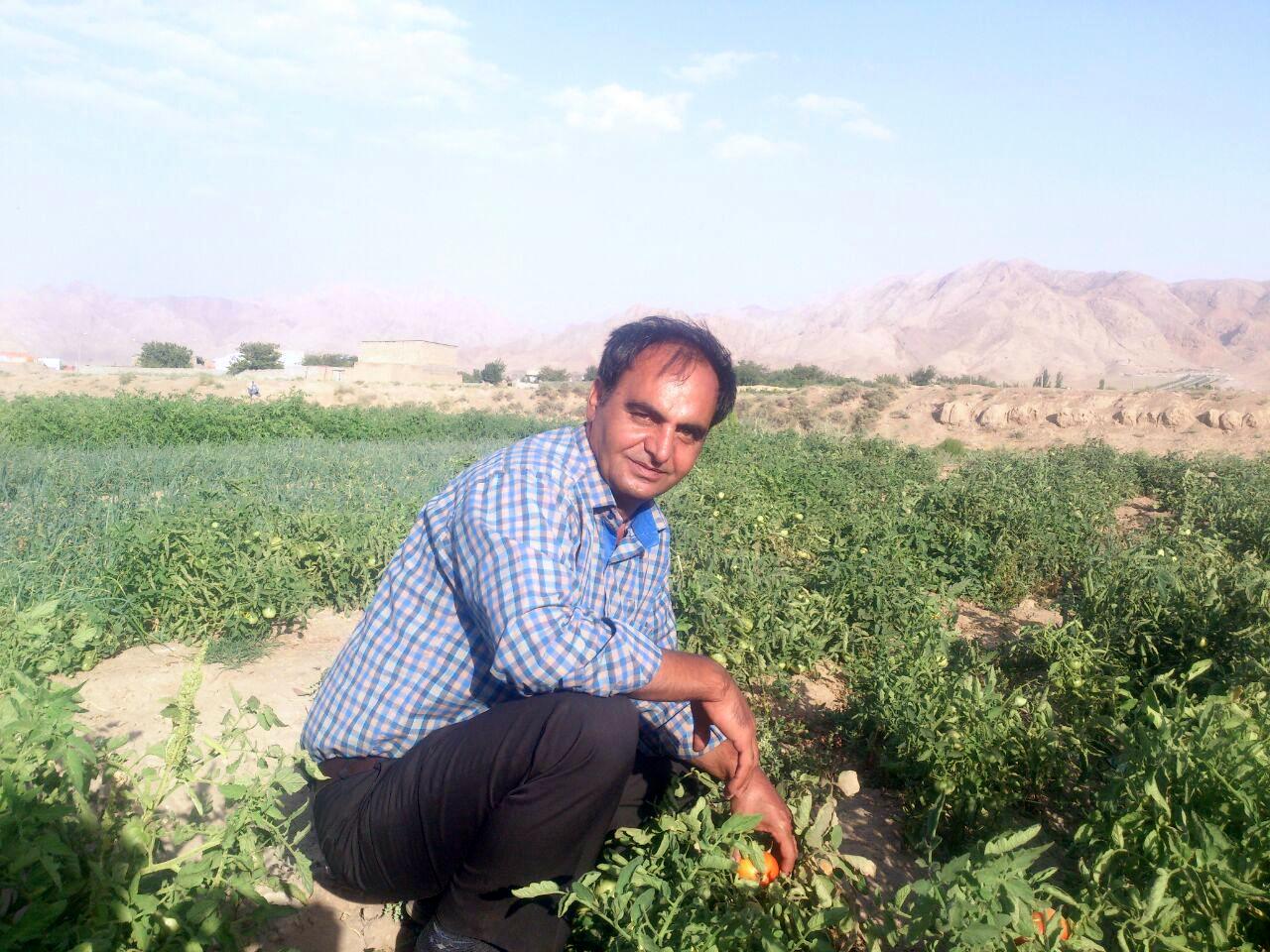
All the efforts for creating Keshmoon have been to tell farmers like Haji Hasan Zare’kar and other farmers who rely on Shahik Qanat to not be worried about their incomes and to be assured that the internet and new age remedies can assist you. We want to remind farmers that by farming the less water intensive crop of saffron through improved farming techniques, your income will be more than before. But we must do this all while taking a hard critical look at the water situation in our country and understand what kind of farming practices we can use to improve and change the situation.
Keshmoon is an online platform where saffron farmers working in Qaenat (South Khorasan) have the opportunity to market their saffron for consumers around the world to buy directly from their farms. On our website, you can find stories of the saffron farmers and become acquainted with the details of their personal lives as well as the various stages of farming. Through Keshmoon, you can choose your farmer and buy saffron directly from them.

(Saffron Harvesting and Meeting Farmers) Tour
In 2017, Keshmoon hosted a three-day tour to Qaenat to meet the farmers involved in our work and to witness firsthand the harvesting and drying of saffron. Over this one year, there were many people who were just getting familiar with our organization and this provided them with the perfect opportunity to experience our work personally.
This is why we have decided that this year during the harvesting season of saffron, which falls in November, we will hold a saffron tour and travel to the Qaen villages.
This trip will be held in cooperation with the Sepehr Cultural Development Foundation. The Sepehr Cultural Development is a fully-fledged organization that works to empower members of local communities and villages in the Qaen region. Since many of the villages we work in are involved with this organization, we decided to collaborate with this group for the tour.
Information regarding Tour
Tour Location: South Khorasan Province, Qaen City, Tajen Village.
Date of Departure: 17:00, Monday 29th of October 2018, From South Tehran Terminal.
Return Date: 17:00, Thursday 1st of November 2018, Qaen Terminal.
The degree of Difficulty of Trip: Medium.
Capacity: Limited.
Travel Cost: 540 USD (includes round trip from Tehran)
Registration Method: Contact Number: +989157409204 (every day from 11:00 to 13:00 and also from 19:00 to 21:00)
Registration Deadline: Thursday 25th of October 2018
Necessary Supplies: ID cards, personal medications, warm clothes, comfortable shoes, sunscreen, hats, and sunglasses.
Tour Program: attend a saffron farm and engage in the harvesting of saffron, pick saffron flowers with the farmer and extract saffron from the flowers with the farmers themselves, stay in rural homes with locals, eat local cuisine, visit Tajen village, see live folk music
Reviews on Saffron Harvesting Tour from 2016
During the Saffron Harvest season of 2016, we hosted the first guests to Keshmoon farms. Below you will find the reviews of two foreigners who visited our farm to get a better understanding of the experience on our tour.

Rachel, Iranian-French Tourist
I traveled to Qaen from 28th to 29th October 2016 at the harvesting season. I came to write a photo article about Keshmoon and the work of saffron smallholder farmers of Qaen working biologically, but I left with much more.
I lived two extraordinary days with Mo’s family, who opened their doors, their heart and who offered us their trust.
At sunrise, we participated with them in saffron harvest, in a climate of peace and harmony I never experienced.
I left with beautiful pictures but above all with friends, a new family...

Betty, French Tourist
Unique and very interesting experience in the land of saffron.
First, meeting people of a very great kindness: the welcome of Mo's family really warms our hearts.
We discovered a new world, made of work and simplicity, within a beautiful nature. All generations are united in the effort to harvest this red gold! What hard work to produce this spice with perfume like no other in the world! A unique experience for me that left me the will to better know this region and the people who live there.
ارسال پیام به Haji Hasan Zare’kar
به منظور ثبت پیام برای کشاورز، ابتدا وارد سایت شوید؛ در صورتی که عضویت ندارید، ابتدا در سایت عضو شوید.
ورود به سایت عضویت در سایت
اولین نفری باشید که با Haji Hasan Zare’kar آشنا می شود، از او خرید می کند و نظرش را درباره زعفرانش می نویسد!